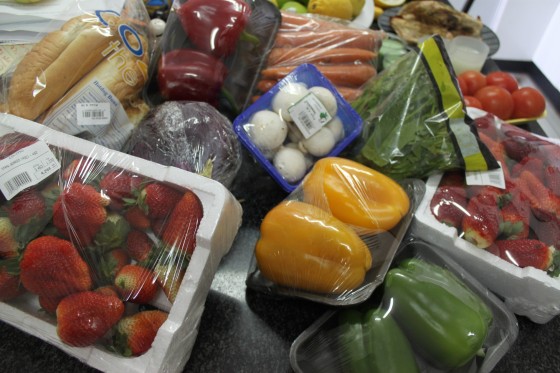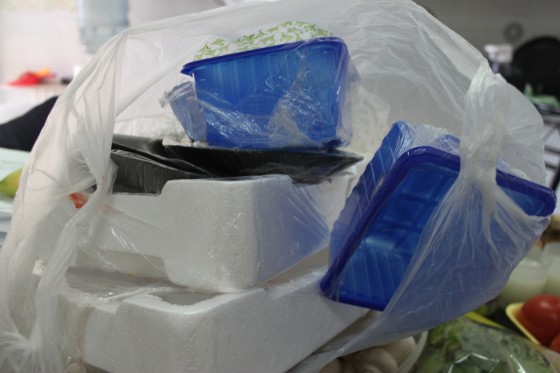Random dumping and burning of plastic garbage, which constitutes a fifth of the Kingdom’s solid waste, are negatively affecting the environment and public health, said a Jordanian official.
Good morning, Jordan! Glad to see you waking up to your plastic addiction and outrageously dirty dumping disorder. Plastics, widely introduced to world markets in the 1960’s, have been soiling the kingdom’s landscape for half a century in the form of disposable bottles, bags and product packaging. Rising population in an increasingly urban setting helps speed the use (or disuse) of the nasty buggers.
Manufacturing is heavily reliant on plastics for packaging, our mostly imported goods come swaddled in the stuff, and the kingdom is mad for clear wrap (walk out of any grocery store with yards of plastic around your purchases – see what came with my latest run to the market, above). The problem is when you throw it all out – see below.
Environment Ministry Secretary General Ahmad Qatarneh said as much during a one-day conference for school kids on the environmental and health impacts of plastic.
“As the ministry bans the burning and dumping of plastic waste, it encourages the public to reduce the use of plastic, recycle it and dispose of it properly,” said Qatarneh, according to The Jordan Times.
Environment Ministry figures indicate alarming plastic pollution statistics for Jordan:
• Jordan generates 6 million tons of solid waste every year, 20% are plastics
• Each Jordanian generates on average 2.2 pounds of solid waste daily
• Jordanians use an average of 1.5 plastic bags per day – that’s 500 plastic bags each, yearly!
• 3 billion plastic bags are used in the country annually, only 20% find their way to landfills
Qatarneh said the ministry has prepared a draft law for regulating waste management, which includes a plastic waste management plan and a policy for limiting the negative impact of plastic bags.
“We are hopeful that the policies will be adopted on a national level by using the Regulatory Impact Analysis [RIA], which will be applied for the first time in the Arab region,” Qatarneh noted. An RIA is created before new regulations are introduced to examine potential impact and success potential.
Qatarneh underscored that conventional plastic disposal methods, such as burying, are no longer environmentally or economically feasible, and that limiting plastic production and recycling it to generate energy are examples of the future integrated management plan.
Sounds swell, but why not also jump on the simple three step program proven successful in so many nations? Ban plastic bags (as our Israeli neighbors have done), implement a recycling culture, and roll-out a public education campaign beginning with our schools.
Littering is a serious problem in Jordan, where trash collection infrastructure is poorly developed and people are nonplussed by tossing trash in public and open spaces.
Plastic bags are one of the most prevalent types of land litter. Plastic debris can clog drainage systems and contribute to flooding. It kills hapless animals who ingest it. And even landlocked Jordan is experiencing marine pollution problems as its trash makes its way into the Dead and Red Seas.
It’s action time.






Very helpful article. I love this topic. Plastic items are the worst enemy for the environment .
Jean – please share what you learn.
I was thinking how those veggies-wrapped-in-clear-wrap looks like a pop-art version of a classic still-life. You’re just the one to paint it! A surreal addition to your series of paintings on food…
Great article Laurie. I would like to learn more about the actual health hazards posed by burning and burying plastic. Until people learn how bad this is for us and the environment they won’t be convinced to stop. I think you just inspired me to do some more reading!